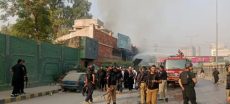Nearly 300 people have been killed in Bangladesh since the fall of former Prime Minister Sheikh Hasina, as political unrest continues to grip the nation. Clashes between rival groups and security forces have erupted in several cities, leaving the country on edge.
Authorities say the violence intensified after Hasina’s resignation, with rival political factions vying for control amid a fragile transition period. Reports indicate widespread arson, looting, and street battles in Dhaka, Chittagong, and other major urban centers.
Human rights groups have condemned the escalating bloodshed, urging restraint from both the government and opposition forces. Many of the victims are civilians caught in crossfire or targeted for political affiliations.
Security forces have been deployed nationwide to restore order, but tensions remain high as protests and strikes continue. The army has also been placed on alert to prevent further deterioration of the situation.
Analysts warn that Bangladesh risks sliding into deeper instability unless dialogue resumes between rival political camps. The absence of a unified leadership has fueled chaos and uncertainty across the country.
International observers have called for immediate intervention to protect civilians and initiate peace talks. The United Nations has expressed concern over the mounting casualties and urged calm.











